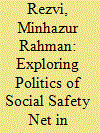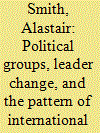| Srl | Item |
| 1 |
ID:
182457


|
|
|
|
|
| Summary/Abstract |
The purpose of the study is to explore the politics of beneficiaries’ selection and resource distribution of social safety net (SSN) programs and how local elites and political groups establish political settlement by using it as a tool. In developing countries, formal systems are not strong enough and elites’ groups use their power to create informal institutions for securing their interests. As other studies have shown, informal politics influence the processes of selection and distribution of SSN programs in Bangladesh. The study is qualitative in nature and the selected research area is Rajakhali Union in Cox’s Bazar District. The study found that informal systems (e.g. clientelist politics, political affiliation, personal conflicts, and kinship) determine the selection and distribution of SSN programs. The Union Parishad (UP) members distribute the SSN programs to their ineligible clients (supporters, local elites, and political groups) by bypassing the formal systems for strengthening clientelist relations, increasing their legitimacy, stabling their power, and increasing their vote banks. They (UP members, political elites, and local elites) have allowed introducing more informal structures that better serve their interests. They have used the SSN programs as a tool for establishing the political settlement (distribution of power between UP members and local elites).
|
|
|
|
|
|
|
|
|
|
|
|
|
|
|
|
| 2 |
ID:
169675


|
|
|
|
|
| Summary/Abstract |
BRANDON K. YODER, KURT TAYLOR GAUBATZ and RACHEL A. SCHUTTE argue that when political actors adopt public discourse that misrepresents their preferences, they risk hindering the effectiveness of private discussion required for them to meet their goals.
|
|
|
|
|
|
|
|
|
|
|
|
|
|
|
|
| 3 |
ID:
092047


|
|
|
|
|
| Publication |
2009.
|
| Summary/Abstract |
Nations are politically heterogeneous and which group is in political ascendency shapes the nature of interstate cooperation through two mechanisms. First, groups differ in the benefits they receive from cooperation. This affects which groups can commit to cooperate. Second, a nation may selectively withhold cooperation from one group to influence the domestic political competition between groups in another nation. By integrating political competition between leaders of different groups under different institutional rules into a prisoner's dilemma model of international cooperation, the theory generates hypotheses relating leader turnover, group membership, and patterns of cooperation.
|
|
|
|
|
|
|
|
|
|
|
|
|
|
|
|